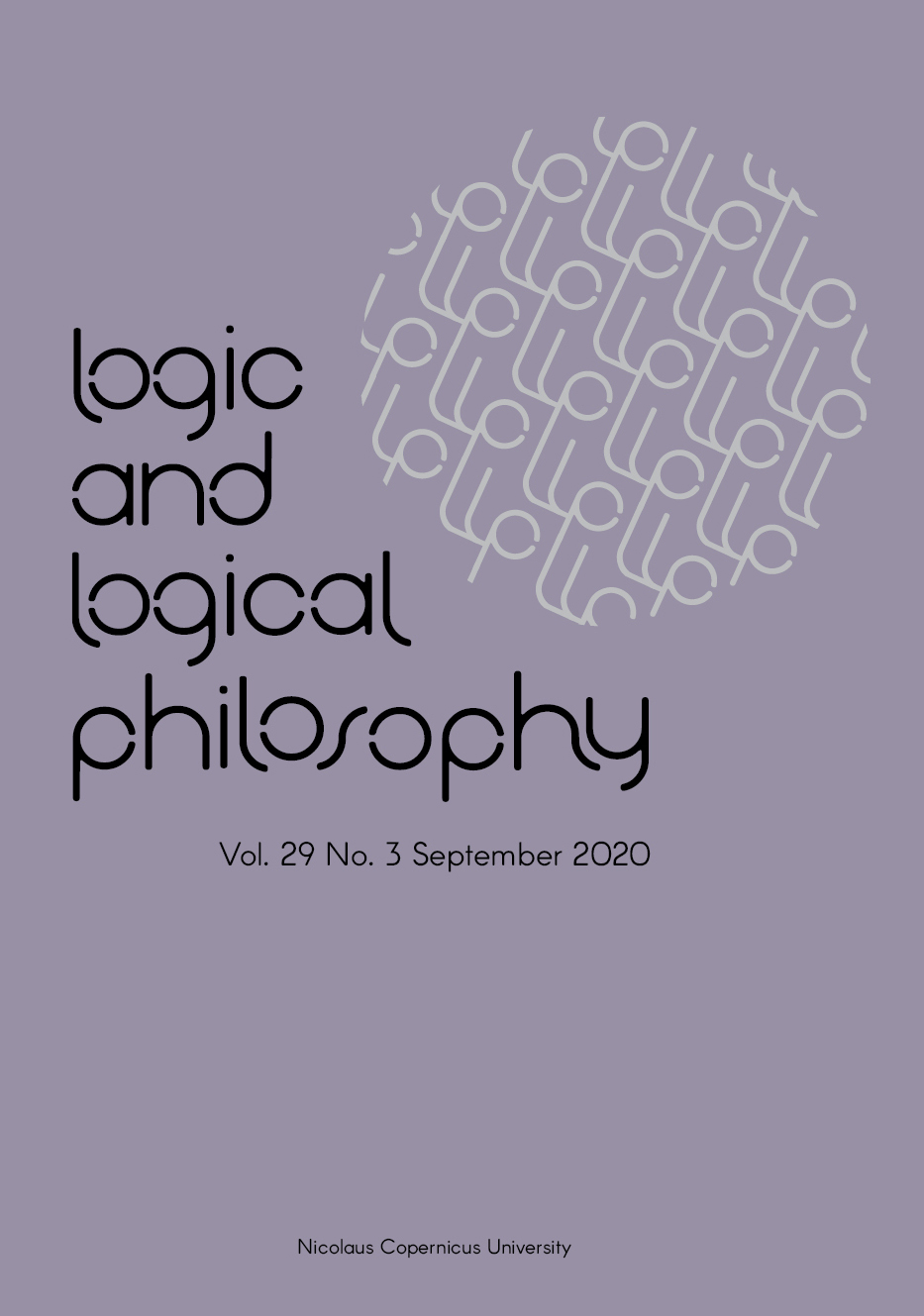False Re-Representations in Self-Knowledge
DOI:
https://doi.org/10.12775/LLP.2020.007Keywords
self-knowledge, representations, misidentification, propositional attitudes, self-model, applied logicAbstract
Self-knowledge (SK) is a natural ability of the human cognitive system and is defined as a complex re-representation of knowledge subject has about her own internal states. It is composed of two basic representations: the representation of I and the representation of the experienced state. SK has a propositional (i.e. language-like) form and can be expressed in the form of self-reports like “I believe that I believe that p”. It has then the form of a second-order belief which, as a re-representation, generates the following problem concerning false representations: if the first-order representations of the I or of experienced states can be false like in cases of self-illusions or disorders like somatoparaphrenia, then how can error in self-cognition inherited by the re-representation (i.e. by SK) be avoided?
I claim that the re-representational model of SK is a useful but artificial tool for the description of the components of SK; however, it is misleading to think of it as capturing the truth about SK. I propose here a representational model of SK which reduces those beliefs constituting SK to first-order beliefs which are sufficient as constituents of SK.
References
Aspell, J.E., B. Lenggenhager and O. Blanke, 2012, “Multisensory perception and bodily self-consciousness: From out-of-body to inside-body experience”, Chapter 24 in M.M. Murray, M.T. Wallace (eds.), The Neural Bases of Multisensory Processes, Boca Raton (FL): CRC Press, Taylor & Francis. Available from: https://www.ncbi.nlm.nih.gov/books/NBK92870/
Bar-On, D., 2004, Speaking My Mind. Expression and Self-Knowledge, Oxford: Clarendon Press.
Bermúdez, J.L., 2012, “Memory judgments and immunity to error through misidentification”, Grazer Philosophische Studien 84: 123–142.
Blanke, O., and T. Metzinger, 2009, “Full-body illusions and minimal phenomenal selfhood”, Trends in cognitive sciences 13: 8–13. DOI: http://dx.doi.org/10.1016/j.tics.2008.10.003
Boghossian, P.A., 2008, Content and Justification. Philosophical Papers, Oxford: Oxford Clarendon Press.
Case, L., R. Abrams and V.S. Ramachandran, 2010, “Immediate interpersonal and intermanual referral of sensations following anesthetic block of one arm”, Archives of Neurology 67(12): 1521–1523.
Descartes, R., 1637/2009, Discourse on the Method of Rightly Conducting the Reason and Seeking Truth in the Field of Science, SMK Books.
Dretske, F., 1981, Knowledge and the Flow of Information, Cambridge, Massachusetts: The MIT Press.
Fodor, J.A., 1985, “Fodor’s guide to mental representation: The intelligent Auntie’s vade-mecum, Mind 94 (373): 76–100.
Fodor, J.A., 1987, Psychosemantics, Cambridge, MA: The MIT Press.
Fodor, J.A., 1991, “A modal argument for narrow content”, Journal of Philosophy 88: 5–26.
Frege, G., 1892/1994, “Über Sinn und Bedeutung”, in G. Patzig (ed.), Funktion, Begriff, Bedeutung, Göttingen, Vandenhoeck & Ruprecht.
Friston, K.J., J. Daunizeau and S.J. Kiebel, 2009, “Reinforcement learning or active inference?”, PLoS ONE 4, e6421. DOI: http://dx.doi.org/10.1371/journal.pone.0006421
Guttenplan, S., 1994, “First person authority”, in S. Guttenplan (ed.) A Companion to the Philosophy of Mind, Oxford: Blackwell.
Hohwy, J., 2012, “Attention and conscious perception in the hypothesis testing brain”, Frontiers in Psychology 3. DOI: http://dx.doi.org/103389/fpsyg.2012.00096
Ionta, S., L. Heydrich and B. Lenggenhager, 2011, “Multisensory mechanisms in temporo-parietal cortex support self-location and first person perspective”, Neuron 28: 263–374.
Lane, T., and C. Liang, 2009, “Higher-order thought and pathological self: The case of somatoparaphrenia”, Analysis 69 (4): 661–668. DOI: http://dx.doi.org/10.1093/analys/anp094
Lenggenhager, B., T. Tadji, T. Metzinger and O. Blanke, 2007, “Video ergo sum: Manipulating bodily self-consciousness”, Science 317: 1096–1099.
Limanowski, J., 2014, “What can body ownership illusions tell us about minimal phenomenal selfhood?”, Frontiers in Human Neuroscience 8: 946. DOI: http://dx.doi.org/10.3389/fnhum.2014.00946
Limanowski, J., 2017, “(Dis-)attending to the body – action and self-experience in the active inference framework”, in T. Metzinger and W. Wiese (eds.), Philosophy and Predictive Processing, 18, Frankfurt am Main: MIND Group. DOI: http://dx.doi.org/10.15502/9783958573192
Metzinger, T., 2017, “The problem of mental action: Predictive control without sensory sheets”, in T. Metzinger and W. Wiese (eds.), Philosophy and Predictive Processing, 19, Frankfurt am Main: MIND Group. DOI: http://dx.doi.org/10.15502/9783958573208
Pacholik-Żuromska, A., 2019, “Modele jaźni w samowiedzy”, Filozofia Nauki 27 (3) [107]: 55–76. DOI: http://dx.doi.org/10.14394/filnau.2019.0017
Peacocke, Ch., 1999, Being Known, Oxford: Clarendon Press.
Putnam, H., 1981, “Brains in a vat”, pages 1–21 in Reason, Truth and History, Cambridge: Cambridge University Press.
Ramachandran, V.S., B. Krause and L.K. Case, 2011, “The phantom head”, Perception 40 (3): 367–370.
Ramachandran, V.S., and E.L. Altschuler, 2009, “The use of visual feedback, in particular mirror visual feedback, in restoring brain function”, Brain 132 (7): 1693–1710.
Rosenthal, D.M., 2010, “Consciousness, the self and bodily location”, Analysis 70 (2): 270–276. DOI: http://dx.doi.org/10.1093/analys/anp167
Shoemaker, S., 1994, “Self-knowledge and “inner sense””, Philosophy and Phenomenological Research LIV (2): 249–314.
Schooler, J.W., and C.A. Schreiber, 2004, “Experience, meta-consciousness and the paradox of introspection”, Journal of Consciousness Studies 11 (7–8): 17–39.
Seth, A.K., 2015, “The cybernetic Bayesian brain: From interoceptive inference to sensorimotor contingencies”, in T. Metzinger and J.M. Windt (eds.), Open MIND, Cambridge, MA: The MIT Press.
Williamson, T., 2000, Knowledge and its Limits, Oxford: Oxford University Press. DOI: http://dx.doi.org/10.1093/019925656X.001.0001
Wright, C., 1998, “Truth: A traditional debate reviewed”, Canadian Journal of Philosophy 28 (sup1): 31–74.
Downloads
Published
How to Cite
Issue
Section
Stats
Number of views and downloads: 936
Number of citations: 0







